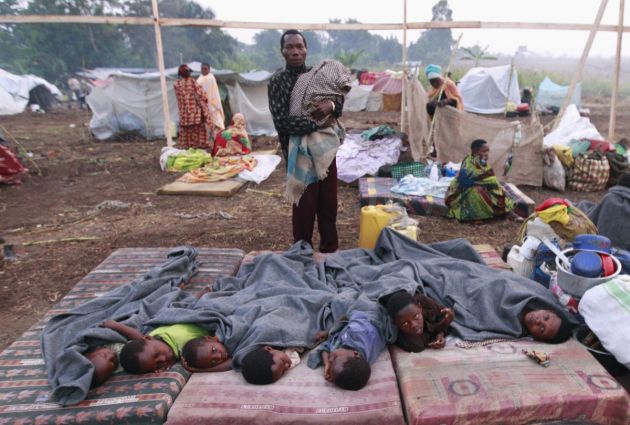Refugee influx from Congo strains new Uganda camp

Aid agencies including the church-backed ACT Alliance say that a refugee exodus from Congo has left a new camp in western Uganda straining at the seams.
Uganda last week expressed alarm at the influx of Congolese refugees in its territory, saying it had increased vulnerability of border communities and disrupted basic services in the country.
"The government of Uganda is alarmed by the extraordinary influx of refugees fleeing to Uganda following the attack launched by the Allied Democratic Front (ADF) on the border town of Kamango in the Democratic Republic of Congo (DRC) on the morning of 12 July 2013," the country's foreign affairs minister, Sam Kutesa, said in a statement on Wednesday.
The regugee crisis there may not be high on the global agenda with the Syrian crisis grabbbing global attention, but aid groups have pleaded that such
Following ADF attacks on Kamango, in the eastern Congo, the Ugandan Red Cross put the number of Congolese refugees that had fled into Uganda's western district of Bundibugyo at 66,000. The Ugandan foreign ministry said this number had since risen.
FRESH FIGHTING
Fresh fighting has also broken out in DRC's volatile North Kivu region which has led to more Congolese refugees fleeing to the Kisoro district, in western Uganda.
"So far, 67,000 refugees have fled into Bundigugyo. A new emergency situation is unfolding in the western district of Kisoro where to date over 1,800 refugees have sought sanctuary and more [are] expected to arrive due to renewed fighting between the Congolese Armed Forces (FAEDC) and M23 in North Kivu," the Ugandan government statement said.
ACT Alliance said its members, including the Lutheran World Federation (LWF), have increased efforts to provide life-saving water, sanitation and hygiene services to the camp refugees.
Before dawn on July 11, residents of Kamango, eastern DRC, woke to gunfire from the rebels, who went on to attack civilians and government soldiers. Within only two days, more than 66,000 refugees had fled.
The influx found Uganda unprepared, but within a week the Bubukwanga camp was established and the United Nations refugee agency, UNHCR, and the Uganda prime minister's office were coordinating relief agencies.
Bubukwanga has become temporary home to nearly 15,600 refugees.
ACT Alliance member, the Lutheran World Federation, was among the first at Bubukwanga.
To date, it has supplied large water tanks, hand-washing facilities, and jerry cans and soap, has sent in hygiene promoters and construction shelter staff, and has fenced 450 meters (475 yards) of the camp.
Yet the camp remains overstretched. Urgent support is needed to meet the basic needs of the refugees, with one government official saying shelter, sanitation and hygiene were among the critical shortfalls.
Camp residents are sharing latrines at a rate of nearly 15 times the recommended number. Washing and water facilities are far from adequate.
UNHCR
UNHCR expects a total of 20,000 people within a short period as convoys continue arriving with refugees. The LWF is preparing for even more arrivals in the coming days.
"I escaped from the hospital with my new born baby," one refugee, Mary Maurita, aged 20, who breastfeeds her four-day-old baby in a shelter made from palm tree stems covered with grey blankets told ACT Alliance's Mai Gad who works for the Danish church agency, DCA.
Only four hours after giving birth, Mary heard gunfire and ran from the hospital to her home. She woke her husband, Kalikona Bosco, 24, and their two-year-old son Mawombi Richard.
"It was chaotic, I just carried my baby and what I was putting on. We ran as fast as we could to escape the bullets, but I was in pain because of the birth," Mary says.
Lutheran World Federation's sexual and gender based violence counselor in Bubukwanga, Ndiji Kwaninitedid, said it is highly risky to return to DRC at the moment.
He knew of a large group of women who had gone back. En route, soldiers raped a number and killed those who refused their aggression.
Ndiji said many rape cases go unreported to Ugandan police. Women were afraid their husbands and partners would reject them if they know they had been raped.
In response to sexual violence among the Congolese refugees, UNHCR have asked the LWF to lead the anti-violence unit in Bubukwanga camp. Counselors among the refugees support survivors and ensure they know how to report abuse.